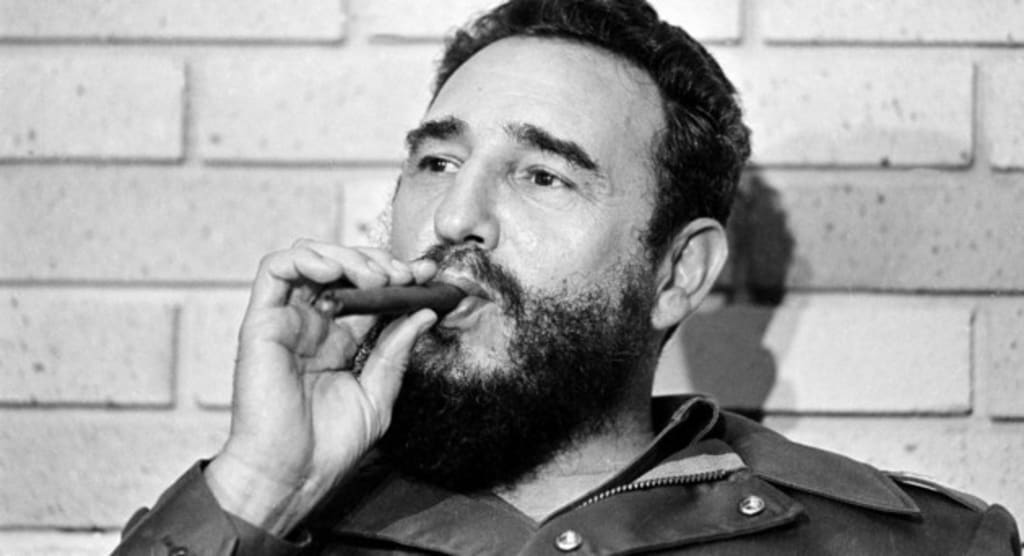The Dual Legacy of Fidel Castro captures the idea that Castro's rule had both positive and negative dimensions, which is a central theme of the analysis.
Reformer or Autocrat?" further highlights the debate over how to characterize Castro - was he truly a reformer advancing Cuban society or just another Latin American strongman? Using the word "nuanced" signals that the article will try to take a balanced perspective in assessing this debate over Castro's contested legacy.

Fidel Castro was a towering yet controversial figure in 20th century Latin American history. His nearly 50-year rule of Cuba embodied the mixed legacy of both progress and oppression that characterized many authoritarian regimes of the time.
Castro first rose to prominence in the 1950s as a revolutionary opposed to the corrupt dictatorship of Fulgencio Batista. He led a guerrilla insurgency that succeeded in toppling Batista's regime in 1959, installing himself as Prime Minister and then President. Castro aligned Cuba with the Soviet Union, instituting a communist system of government and embarking on ambitious programs of social reform.
On the positive side, Castro oversaw major improvements in areas like education, healthcare and racial equality. Cuba achieved high literacy rates and its educational system became a model for other developing countries. The country also developed an acclaimed healthcare system providing free universal coverage. These social programs benefited the poor and helped produce health outcomes on par with developed nations. Castro promoted racial integration, opening up opportunities for Afro-Cubans who had experienced discrimination. Women were also encouraged to participate more fully in the workforce and government. These progressive policies made Castro popular both at home and abroad, especially in the developing world.
However, Castro's regime was also repressive and authoritarian. Political dissent was not tolerated, with opponents often imprisoned or exiled. The state dominated economic and social life, suppressing private enterprise and independent organizations. A pervasive security apparatus spied on and controlled ordinary Cubans. Though some personal freedoms were granted in the post-Soviet period, Castro's Cuba remained a one-party dictatorship throughout his rule.
Internationally, Castro adopted an anti-imperialist foreign policy challenging US hegemony in the Americas. This led to increasing tensions with the US, culminating in the 1962 Cuban Missile Crisis that brought the world to the brink of nuclear war. Thereafter, the US imposed a strict economic embargo on Cuba that isolated the country and constrained its development. Castro turned to the Soviet bloc for support, making Cuba a Soviet client state during the Cold War era.
Cuba's alignment with the Eastern Bloc and Castro's efforts to sponsor leftist revolutions abroad significantly shaped perceptions of his rule. Western critics saw him as a dangerous communist revolutionary undermining regional stability. But he was hailed as an anti-colonial icon by many in the developing world for standing up to US imperialism and charting an independent path of national development.
In assessing Castro's complex legacy, his social policies yielded clear benefits for the Cuban people in areas like education and healthcare. He prided himself on building a society based on egalitarian ideals that provided opportunities for the poor and marginalized. But the lack of political and economic freedoms under his authoritarian rule has to be weighed against those achievements.
While Castro is admired by some as a revolutionary leader who advanced Cuba's nationalism and socioeconomic development, critics characterize him as just another Latin American caudillo who erected a repressive dictatorship. The one-party system concentrated power in his hands and those of the communist elite. It is debatable whether the ends justified the means in Castro's Cuba.
Since stepping down in 2008, Castro's socialist model has slowly given way to more market reforms and openness. With his passing in 2016, Cuba lost a towering historical figure. But the polarized debate over Castro's legacy continues. Supporters extol his resistance to US domination and progressive social policies that benefited the Cuban people. Critics highlight the costs to human rights and freedoms resulting from his authoritarian mode of governance.
After six decades in power, Castro leaves behind a mixed record of both advancing Cuban nationalism and working to uplift the poor, while simultaneously building a repressive communist dictatorship that brooked no dissent. The dual nature of his legacy defies simplistic conclusions. The gains in education, healthcare and racial equality represent the positive side of his regime. But the lack of democracy, suppression of opposition and economic failings reveal its darker dimensions.
As Cuba moves into a post-Castro era, new generations of Cubans continue wrestling with his complex legacy. But his outsized impact on Cuban history is undeniable. Love him or hate him, Fidel Castro was unquestionably one of the towering - albeit controversial - political figures that shaped the story of modern Latin America. His rule left behind a complex duality of achievement and oppression that will be long debated by both admirers and critics.
About the Creator
KWAO LEARNER WINFRED
History is my passion. Ever since I was a child, I've been fascinated by the stories of the past. I eagerly soaked up tales of ancient civilizations, heroic adventures.






Comments
There are no comments for this story
Be the first to respond and start the conversation.